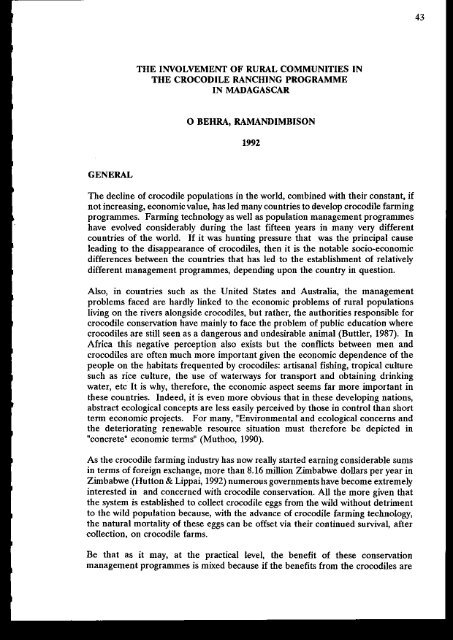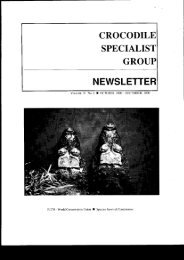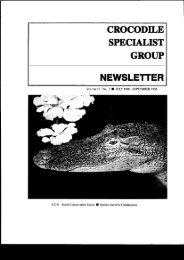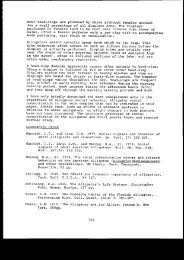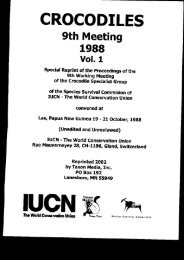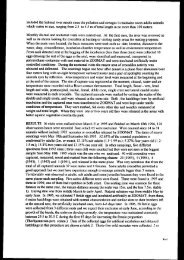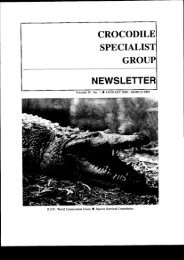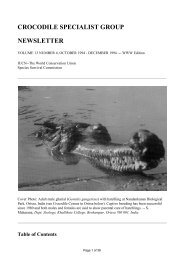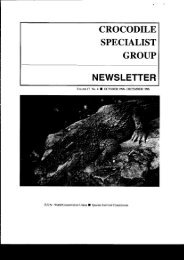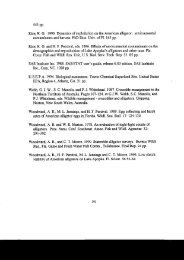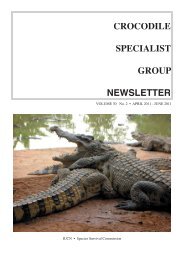size: 5036KB - Crocodile Specialist Group
size: 5036KB - Crocodile Specialist Group
size: 5036KB - Crocodile Specialist Group
You also want an ePaper? Increase the reach of your titles
YUMPU automatically turns print PDFs into web optimized ePapers that Google loves.
43<br />
THE INVOLVEMENT OF RURAL COMMUNITIESIN<br />
THE CROCODILE RANCHINC PROGRAMME<br />
IN MADAGASCAR<br />
O BEHM, MMANDIMBISON<br />
1992<br />
GENERAL<br />
The declitre ol crocodile populations in the world, combined with their consta[t, if<br />
not increasing, economic value, has led many countries to develop crocodile farming<br />
programmes. Farming technolos/ as well as population management programmes<br />
have evolved considerably during the last fifteen yean in many very different<br />
countdes of the world. If it was hunting pressure that was the p ncipal cause<br />
leading to the disappearance of crocodiles, then it is the notable socio-economic<br />
differences tretween the couDtries that has led to the establishment of relatively<br />
different management programmes, depending upon the country in questioo.<br />
Also, in count es such as the Udted States atrd Australia, the management<br />
problems faced are hardly linked to the ecouomic problems of rural populations<br />
lMng on the vels alongside crocodiles, but nther, the authorities responsible for<br />
crocodile conseNation have mainly to face the problem of public education where<br />
crocodiles are still seen as a dangerous and undesirable atrimal (Buttler, 1987). In<br />
Aftica this negative perception also exists but the conflicts between men and<br />
crocodiles are often much more importatrt given the economic dependence of the<br />
people on the habitats ftequented by crocodiles: artisanal fishing, tropical culture<br />
such as ce culture, the use of waterways for transport and obtaining drinking<br />
water, etc It is why, therefore, the ecooomic aspect seems far more important in<br />
these count es. Indeed, it is even more obvious that in these developing nations,<br />
abstract ecological concepts are less easily perceived by those in control thatr short<br />
term economic projects. For many, "Environmental and ecological concems and<br />
the dete orating renewable resource situation must therefore be depicted in<br />
"concrete" economic terms" (Muthoo, 1990).<br />
As the crocodile farming industy has trow really started eaming considerable sums<br />
in terms of foieign exchange, more than 8,16 million Zimbabwe dollars per year in<br />
Zimbabwe (Hutton & Lippai, 1992) numerous governments have become extremely<br />
interested in and concerned with crocodile conservation. All the more given that<br />
the system is established to collect crocodile eggs ftom the wild without dehiment<br />
to the wild population because, with the advance of crocodile farming technology,<br />
the natural mortality of these eggs can be offset via theii continued survival, after<br />
collection, on crocodile farms.<br />
Be that as it may, at the practical level, the benefit of these cooservation<br />
management programmes is mixed because il t}re benefits ftom the crocodiles are


